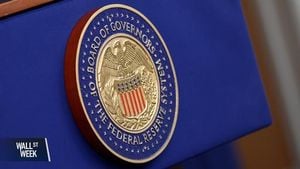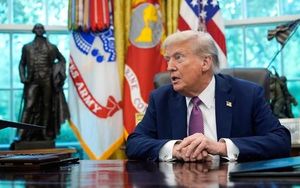LOS ANGELES — Peter Tripp Akemann, the drone pilot whose reckless flight led to the dramatic collision with firefighting aircraft during the Palisades Fire, has pleaded guilty to unsafely operating his unmanned machine from over 1.5 miles away. This incident not only posed serious risks to the aerial firefighting efforts but also grounded the firefighting aircraft, leading to significant repercussions as wildfires raged across the area.
The U.S. Attorney’s Office for the Central District of California disclosed the plea agreement on January 31, 2025, asserting Akemann faces the possibility of up to one year behind bars—but he will serve no prison time as part of the deal. Instead, Acting U.S. Attorney Joseph T. McNally confirmed he must pay restitution totaling $65,169 to cover the aircraft damages and complete 150 hours of community service concentrated on wildland firefighting efforts.
The palisade fire, which erupted around January 7, compromised nearly 8,000 structures and claimed at least 12 lives as firefighters worked tirelessly against the elements, including destructive Santa Ana winds. On January 9, Akemann launched his drone near Santa Monica’s Third Street Promenade, ostensibly to capture the fire’s damage but lost sight of it shortly after takeoff. Consequently, the drone collided with the wing of a Canadian Super Scooper plane actively battling the flames.
"This damage caused to the Super Scooper is a stark reminder... it poses an extreme threat to personnel trying to help, and compromises the overall ability of police and fire to conduct operations," McNally stated, highlighting the severity of the violation. Fortunately, the Super Scooper managed to land safely, but it was out of commission for days following the incident, underscoring the potentially disastrous consequences of such recklessness.
The collision left a sizeable hole—approximately three inches by six inches—in the left wing of the Super Scooper, which is one of only two of its kind leased by Los Angeles County from Quebec, Canada. The firefighting plane, known for its ability to scoop up to 1,500 gallons of water at once, was rendered ineffective during the intense firefighting efforts due to the damages incurred.
Investigations by the Federal Aviation Administration revealed temporary flight restrictions had been established prohibiting drone flights over the area. McNally underscored the responsibility of drone operators, emphasizing the need for awareness and compliance with regulations, especially during emergencies when aerial operations are underway. "The FAA has very strict guidelines about registering drones and where drones can be flown. The onus is on the pilot," he cautioned.
While Akemann exhibited remorse through his legal representation—asserting he is "deeply sorry for the mistake he made" and accepting "responsibility for his grave error of judgment"—the case raises questions about drone safety amid natural disasters. His attorney noted, "There are mitigating factors, including Mr. Akemann’s reliance on the DJI Drone’s geo-fencing safeguard feature," which he claimed failed during the operation.
Local authorities and the FBI have made it clear they are committed to enforcing drone regulations, particularly as major events such as the Super Bowl and the World Cup approach Los Angeles. Assistant FBI Director Akil Davis expressed the urgency for strict adherence to regulations, stating, “Lack of common sense and ignorance of your duty as a drone pilot will not shield you from criminal charges.”
The Palisades Fire serves as not only a tragic reminder of the dangers posed during wildfire operations but also highlights the necessity for effective regulations surrounding drone use—particularly their prohibition around fire zones where aerial firefighting efforts are underway. The catastrophic potential of drone collisions with emergency aircraft is evident, as it can jeopardize the lives of firefighters and severely impact firefighting responses.
A strong message has been sent through this incident, reinforcing the responsibility placed upon drone operators to inform themselves about legal restrictions and the serious consequences of their actions. The repercussions of this case will resonate beyond Akemann, serving as both cautionary and informative for the growing community of drone hobbyists and professionals alike.
With wildfires increasingly posing dangers each season, the expectations set forth by this legal outcome could prompt operators to take the provided guidelines seriously, ensuring tragedies like the one witnessed during the Palisades Fire remain only lessons of the past.



